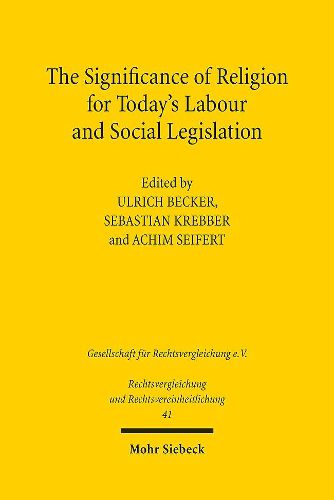Readings Newsletter
Become a Readings Member to make your shopping experience even easier.
Sign in or sign up for free!
You’re not far away from qualifying for FREE standard shipping within Australia
You’ve qualified for FREE standard shipping within Australia
The cart is loading…






The search for the fundamental principles which frame society and hold it together has once again taken on a new urgency in these times of crisis. For this reason, the specialist labour and social law panel of Germany’s Society for Comparative Law (Gesellschaft fur Rechtsvergleichung) brought to its 35th conference in 2015 a group of scholars from different parts of the world in order to investigate the significance of religion for today’s labour and social security laws. The resulting volume starts with a general overview of the impact of religion, economics, and politics on welfare states. The case studies that follow set out the models found in different countries: the corporatist welfare state in Germany that grants various religious groups special roles; France’s laicist system; Sweden, where the state did not say farewell to the national church until the start of the millennium; and the USA, where churches are not deployed to achieve state objectives, but where religious freedom is protected. Turkey and Israel are also included to illustrate two countries whose jurisdictions reflect non-Christian religious orientations. Each report deals with fundamental principles on the one hand, and specific problems pertaining to labour and social law that involve a religious element on the other.
$9.00 standard shipping within Australia
FREE standard shipping within Australia for orders over $100.00
Express & International shipping calculated at checkout
The search for the fundamental principles which frame society and hold it together has once again taken on a new urgency in these times of crisis. For this reason, the specialist labour and social law panel of Germany’s Society for Comparative Law (Gesellschaft fur Rechtsvergleichung) brought to its 35th conference in 2015 a group of scholars from different parts of the world in order to investigate the significance of religion for today’s labour and social security laws. The resulting volume starts with a general overview of the impact of religion, economics, and politics on welfare states. The case studies that follow set out the models found in different countries: the corporatist welfare state in Germany that grants various religious groups special roles; France’s laicist system; Sweden, where the state did not say farewell to the national church until the start of the millennium; and the USA, where churches are not deployed to achieve state objectives, but where religious freedom is protected. Turkey and Israel are also included to illustrate two countries whose jurisdictions reflect non-Christian religious orientations. Each report deals with fundamental principles on the one hand, and specific problems pertaining to labour and social law that involve a religious element on the other.